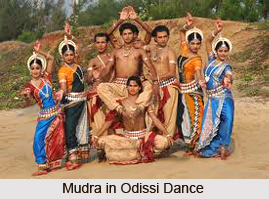 Features of Odissi Music are neither completely Hindustani nor Carnatic. Odissi music has its own unique style of composition and performance which is typical to this classical art form from the eastern state of Orissa. Technically, one can divide the singing style of Odissi into four parts- Natyanga, Raganga, Dhirubapadanga and Bhavanga. These are briefly discussed below.
Features of Odissi Music are neither completely Hindustani nor Carnatic. Odissi music has its own unique style of composition and performance which is typical to this classical art form from the eastern state of Orissa. Technically, one can divide the singing style of Odissi into four parts- Natyanga, Raganga, Dhirubapadanga and Bhavanga. These are briefly discussed below.Natyanga
These are small compositions. These are sung in Natya (small musical plays) or with dance. Such compositions are used in Gotipua dance. The stress in such compositions is on Tala. Pada Vinyas or Swara Vinyas is very sparsely made. Very short Taan is also sandwiched in between.
Ragang
As in any other classical music system, this is the most important aspect of Odissi also. The minimum rules of Raaga Gayan are: at least five swaras must be there; this must belong to a Janya that; rules regarding Jati, Gayan Time, Vadi, Samvadi etc. must be followed; besides these general rules all the characteristics of the particular Raaga are also to be followed.
The Ragang of Odissi as passes through six stages like all other classical systems. These are discussed below.
(i) Anibaddha Alap: Though some practitioners today determine their Anibadha Alap according to the nature of the Raaga, the majority of the practitioners deride this as blind imitation of mainstream system. The latter compose their Anibadha Alap keeping in view the content, spirit and the tune of the composition, and not merely the Raaga.
(ii) Prabandh: In Odissi mostly compositions from medieval Oriya literature are selected as Prabandha. Some modern compositions following the form and content of medieval lyrics are also used. Just above the composition, Raga and Tala to be followed are mentioned by the poet and the Sthai, called 'Ghosa' by the lyricists are also mentioned within the body of the composition. The composition ends with a Vanita, a kind of short colophon in verse form where the name of the poet is mentioned. The singing passes through the three stages of Sthai, Antara and Padi.
For more, visit the link below: